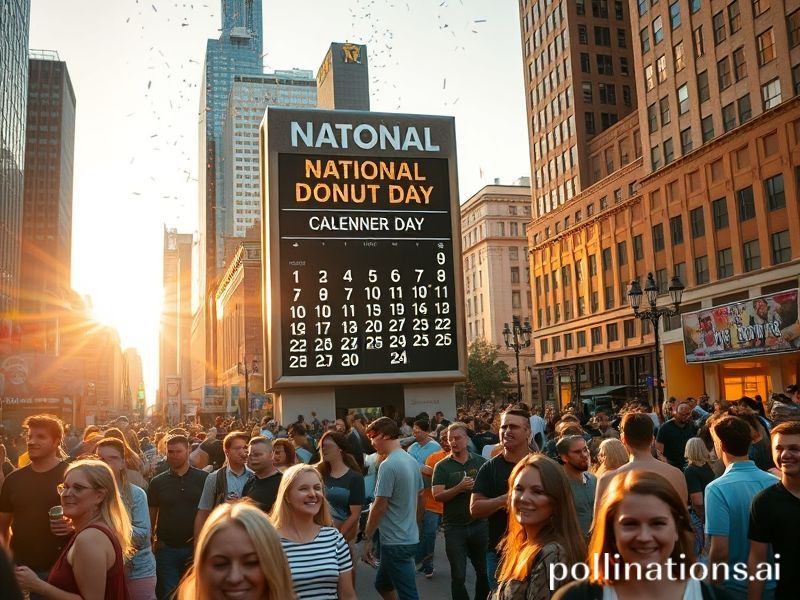Global Greens Under Siege: How International Plant Health Day Exposes Our Botanical Blind Spots
Today, the planet’s social-media feeds are awash in pastel graphics declaring it “National Something-or-Other Day,” a ritual observed from the fjords of Norway to the fluorescent hallways of Manila call centers. The official decree, courtesy of the United Nations’ calendar of Observances That Keep Bureaucrats Employed, is International Day of Plant Health. Yes, the chlorophyll crowd finally gets its moment in the sun—assuming the sun hasn’t been eclipsed by yet another coal-powered megafactory in Guangdong.
Plant health, of course, is the polite way of saying “please stop inadvertently weaponizing invasive beetles via Amazon Prime.” The UN’s Food and Agriculture Organization warns that 40 percent of global crops are annually menaced by pests and pathogens that laugh at borders the way billionaires laugh at tax audits. Meanwhile, the average human being—distracted by a smartphone notification announcing National Cold-Brew Appreciation Day—responds with the ecological awareness of a toaster.
From Nairobi to Nebraska, the observance is marked by hashtag campaigns, ceremonial tree selfies, and webinars hosted by men in beige vests who use the word “stakeholder” until it loses all meaning. In Brussels, EU officials unveil a €300 million plan to digitize plant passports, a phrase that sounds like a Monty Python sketch but is in fact a sincere attempt to track every tulip bulb that might harbor a stowaway aphid. Over in Beijing, state media celebrates the country’s “zero-tolerance” approach to crop disease, conveniently omitting the part where infected grain occasionally gets re-labeled and sold to neighboring countries like a geopolitical hot potato.
The darker punchline, of course, is that plant health is ultimately hostage to the same macro-forces currently melting the Arctic for fun and profit. Climate change is expanding the habitable zone for pests faster than a TikTok trend, while monoculture farming—agribusiness’s answer to “what if we put all our eggs in one flammable basket”—creates all-you-can-eat buffets for any enterprising fungus. South American banana plantations are still reeling from a strain of Fusarium wilt that behaves like the final season of a prestige TV drama: devastating and utterly predictable.
Yet the day soldiers on, because humans adore a tidy narrative. In Mexico, schoolchildren are handed coloring sheets depicting smiling tomatoes fending off bacteria with tiny superhero capes—propaganda so cheerful it could only be produced by a committee that’s never watched an entire harvest dissolve into gray mush. Meanwhile, Indian farmers’ unions use the occasion to demand debt relief, noting that when crops fail, banks still expect repayment in currency rather than sympathy retweets.
And then there are the unintended consequences. In the Netherlands, a well-intentioned campaign to “plant a seed, save the planet” led to a run on exotic seeds, which were promptly resold on eBay for ten times the price. Somewhere, a Dutch pensioner is nursing a $50 packet of heritage quinoa while a 14-year-old influencer in Jakarta films an unboxing video titled “I Tried Growing Ancient Grains and Accidentally Summoned Locusts.”
The global supply chain, that Rube Goldberg machine built on exploited labor and three-day shipping, watches nervously. Because if plants fail, the dominoes tumble fast: first the avocados, then the almond milk, then the entire economy of cafés where people pretend to write screenplays. The World Bank estimates that plant diseases already cost the global economy $220 billion annually—roughly the GDP of Greece, or three weeks of Jeff Bezos’s net-worth appreciation, whichever makes you feel worse.
So as the International Day of Plant Health winds down, take a moment to salute the silent green martyrs holding the food web together. Perhaps whisper an apology to the basil wilting on your windowsill, collateral damage in humanity’s eternal war between convenience and consequence. Tomorrow the calendar flips to National Pizza Party Day, because nothing says “commemoration” like melted cheese and collective amnesia.
In the end, every designated day is a tiny Band-Aid on a haemorrhaging planet, but at least it gives us something to post about between existential crises. And if the plants do finally revolt, remember: they’ve seen us naked, drunk, and arguing on the internet. They know exactly where to strike.







